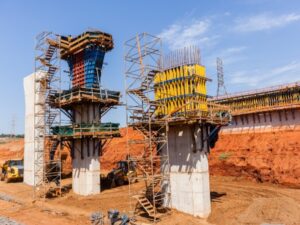The results of Consulting Engineers South Africa’s (CESA’s) Bi-annual Economic and Capacity Survey (BECS) for the period January to June 2022 just released, indicates an improved outlook for 2022 but projections remain below 2% for 2023/24 on the back of higher lending rates dampening potential investment demand and slower consumer demand.
Pressure remains on government to increase investment in infrastructure, up the pace of tender awards, reduce the number of tender cancellations and put measures in place to arrest the increasing ‘brain drain’ of the country’s technical expertise. South Africa’s growth outlook was lifted to 2.3 percent from 1.9 percent in 2022 and 1.4 percent for 2023 with risks remaining in the form of declining private and public sector investment, lack of structural reforms, higher inflation and the impact of tighter monetary policy leading to higher lending rates. We continue to experience inflationary pressures, a weak public fiscus and higher lending rates although private sector investment shows some recovery but investment in construction still shows no signs of recovery. GDP growth is expected to remain at or below 2 percent for the next three years. “The lack of investment in infrastructure development, particularly from the public sector, coupled with the lack of government projects and the slow pace at which tenders are awarded coupled with the high percentage of tender cancellations, is very concerning. The impact of this on the consulting engineering and construction sector is having a devastating effect on the sustainability of companies. The industry is experiencing an increase in the loss of technical skills through emigration. It is a well-known fact that infrastructure development underpins economic growth, and we are appealing to government to stop talking and to start implementing infrastructure projects,” says CESA CEO, Chris Campbell. Business confidence declining – construction sector confidence falls due to lack of government projects and slow pace of tender awards Business confidence slipped lower to 42 in Q2, pulled down by a more negative economic outlook in view of increased loadshedding and higher interest rates. Confidence in the civil sector, fell sharply in the first half of 2022, as construction activity in the civil industry remains constraint by lack of government projects while the higher rate of postponements is diminishing growth potential expected by the uptick in tendering activity in the second half of 2021. The outlook for the following six to twelve months is uncertain, with majority of respondents not expecting a major improvement, maintaining satisfaction rates below 50 percent. Only around a third of the larger firms expect satisfactory conditions in the next 12 months. Pressure on Government to increase Infrastructure Expenditure! The report revealed that the industry may have reached its lower turning point, considering the pressure on government to not only increase infrastructure expenditure but to include the private sector as a partner. The reality is, that once infrastructure programmes kick off, many of which have been in planning for years, the turnaround in the industry can be swift. Tender Cancellations increasing On average, all firm size categories reported a higher percentage of tender cancellations. Difficulties within the public sector associated with project management, planning and implementation is well known resulting in an increased tendency of project cancellations, particularly within local government. This is particularly concerning since local governments have over the last few years been allocated larger shares of the infrastructure budget.Investment in Construction Plunging
Investment in construction plunged to below R250bn (annualized, 2015 prices) in 2021, from a peak of R384bn in 2016. Apart from a correction in 2020, investment mostly contracted on a quarter-on-quarter basis for the past 34 quarters, since 2014. Investment in construction works is currently at 52 percent of its peak in 2013, down to R114bn in Q1 2022 (annualized 2015 prices). Investment in residential buildings dropped to R84bn by Q1 (at 62 percent of its peak in 2007), while investment in non-residential buildings declined to R31,6bn (at 36 percent of its peak in 2008). Credit rating agency Moody’s highlighted the dire consequence of lack of investment in water and electricity and noted that capital expenditure in most of the municipalities rated by Moody’s is below the 10% to 20% of total spending as recommended by Treasury to ensure infrastructure needs are addressed. Government investment continues to decline with GFCF boosted by private sector investment Higher levels of investment by the private sector boosted overall gross fixed capital formation (GFCF), up 3,7 percent. Investment by government declined for the 4th consecutive quarter (down 4,2 percent) with weaker levels of investment also from SOE’s (down 1 percent). Public sector investment failed dismally against the NDP target Public sector investment (including government and SOE’s) as a percentage of GDP declined to 4 percent in the Q1 of 2022, from around 6.5 percent between 2007 and 2015. The public sector failed dismally against the NDP target of 10 percent. The strongest decline is seen in investment by SOE’s down from R140bn per annum to just R68bn, while investment by government slowed from R170bn to R110bn in Q4 of 2021, and with an improved performance in Q2 rose to R114bn. Transformation Woman contributed 12.5 percent in executive or non-executive director roles, of which 86,4 percent were black, coloured or Asian. Men represented the majority share of 87,5 percent, of which 32,5 percent were represented by black, coloured or Asian. Ownership / equity roles contributed 4,2 percent of total employment in the current survey. Fees outstanding continue to be an issue while on a positive note companies reported that their order book to income ratio increased to the highest level since December 2018. The satisfaction rate related to fee income among firms improved to 83.6 percent in the current survey from 77.3 percent in the previous survey and 80.2 percent in the first six months of 2021 (well above the 5-year average prior to Covid-19 when it was around 47 percent. Discounting continues to be an issue while competition remains fierce. Capacity utilisation of technical staff, steadily decreased from 2013 and dropped to its lowest level from 1999 to 74 percent in the Dec 2020 survey. Since then, utilisation has slowly improved reaching 80 percent in the June 2022 survey. Over a third of respondents expect utilisation to further increase, slightly lower from the second half of 2021, with majority expecting levels to remain stable. Less than 1 percent expect a decrease in the second half of 2022. Confidence levels eased to 52.1 in the first half of 2022, from 56.4 in the last six months of 2021, on par with the average of 52 for 2021. The CESA BECS survey provides an analysis of questionnaires completed by their active member firms in the consulting engineering profession providing a proxy for current and expected working conditions for the profession, which is measured and benchmarked on a regular basis. CESA represents over 600 member firms employing in excess of 17 000 people. Access the full BECS Report at https://www.cesa.co.za/becs/






